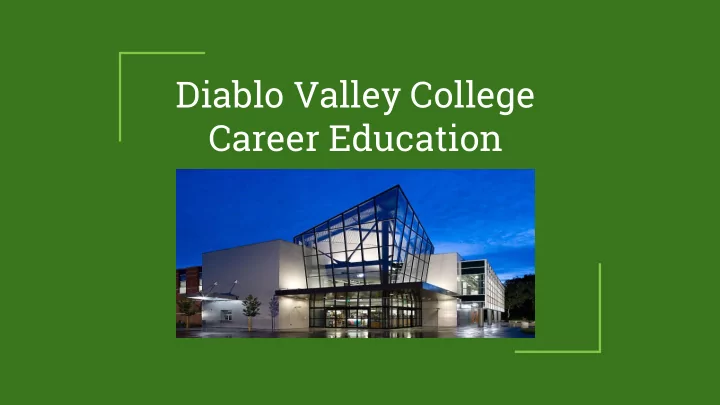

Diablo Valley College Career Education
Career Education (CE) Programs ● DVC offers over 50 certificate and degree programs that prepare students with the skills they need for success in a specific occupation. ● High completion rates for CTE Programs ● DVC is recognized as one of California’s top community colleges, and it also leads the state in transfer to four-year institutions. ● Career Preparation ○ 70% of nurses ○ 80% of firefighters, law enforcement, emergency medical technicians
Certificates, Degrees, and Transfer Paths Transfer Path Certificates ● Accomplishment ● Achievement Associate’s Degree
Certificate of Accomplishment → Associate Degree Associate in Science Certificate of Achievement ● ELECT 266 ● ELECT 266 ● ELTRN 120 ● ELTRN 120 ● ELTRN 121 Certificate of Accomplishment ● ELTRN 121 ● ELECT 130 ● ELECT 266 ● ELECT 130 ● ELECT 220 ● ELTRN 120 ● ELECT 220 ● ELECT 230 ● ELTRN 121 ● ELECT 230 ● ELECT 271 ● ELECT 271 ● ELTRN 210 11 Units ● ELTRN 210 ● 18 Units General Ed ● 16 Units Elective 26 Units 60 Units
Find the right program for you at a California Community College http://californiacommunity colleges.cccco.edu/FindA College ● Search by City, Zip or Address ● Search by Program
https://onetonline.org Other helpful Career Exploration at www.dvc.edu/career
CE Programs - Certificates and Degrees Addiction Studies Early Childhood Education Administration of Justice Electronics/Electricity Art Digital Media Engineering Technology Business Energy Systems Computer Information Film, Television & Electronic Media Systems Geographic Information Systems Computer Network Horticulture Technology Kinesiology Computer Science Library Technology Construction Music Industry Studies Dental Assisting Office Professional Architecture Dental Hygiene Pre-Apprenticeship Small Business Entrepreneur Special Education Paraprofessional Technical Theater Culinary Arts
What is the mTECH program? Industrial maintenance machinists/mechanics (also known as maintenance technicians) work in: ● Refineries ● Chemical plants ● Water utilities ● Steel manufacturing ● And other large manufacturing operations. ● Pay is $20 - $30 per hour for entry level
Pre-Apprenticeship: Full or Part-Time Programs (21 units can be completed in 1 Spring Semester!) ● Prepare to work in the trades ● Students will learn to: ○ Apply basic construction techniques ○ Apply safe work habits ○ Create a work schedule and cost estimates ○ Develop direct hands-on work experience at an off-site location (Fridays) ○ Average of 85% of students transition into paid apprenticeships $17-$24 an hour with benefits directly after the program ○ Must be 18 or older before completion of program
Work Experience (WRKX) Work Experience is an individualized Work Hours Required to Earn WRKX Units work-based learning course where students earn college credit for 2 Units - 10 hr/week or 150 hr/semester on-the-job training and experience at 3 Units - 15 hr/week or 225 hr/semester their job or paid/unpaid internship or 4 Units - 15+ hr/week or 300 hr/semester volunteer position. CSU transferable units.
Work Experience - Continued Students work one-on-one with a college ➢ instructor to craft individualized learning objectives that align with their current job/internship/volunteer position Instructor will meet with student and their ➢ worksite supervisor to implement and assess work-related goals & objectives throughout the semester
Concurrent Enrollment and Asssit.org Concurrent Enrollment - HS students enroll in college course while still in high school College Courses for $1/unit ➢ 11th and 12th graders enroll on a special date ➢ 9th and 10th graders need instructor ➢ permission Check out www.assist.org ➢
HS Articulation – What is it? • An agreement between secondary and post-secondary institutions allowing students to earn college credit while in high school. • College faculty and high school teachers meet and review the college Student Learning Outcomes, textbook/s and required course content for students to earn college credit by exam. • A college readiness strategy for high school students
Why Articulation? • Provides a means for students to begin a program of study in HS which continues at the CC level. • Only appears on transcript if A or B on exam • Impressive on resume and to college applications • Some free college credit • May transfer to CSU and UC • Possession of college credits that never go away • Employers offering benefits for college credits
Growth in Articulated Students in 2017-18, 87% of students qualified for college credit Contra Costa Community College District Articulation CATEMA Students 2010-2016
http://www.dvc.edu/articulation
1 week academy Career Academies at DVC = 2.5 HS credits 1 college credit Only $1.00 DVC Career Academies offer HS & college credit plus an opportunity to explore a variety of career options. Summer camps previously offered: Engineering, Construction, and Manufacturing ● ● Culinary & Hospitality Cyber Patriot - Introductory and Advanced ● ● Business Summer Institute FastTRAX (Engineering and Robotics) - 2 weeks long ● ● Animation Workshop Environmental Engineering ● ● Health Career Institute - 6 weeks long
Career Academies - Continued ➢ Students are immersed in a week of hands-on job related experiences, projects, and field trips. *1 week camp = 2.5 high school credits and 1 college credit all for $1
Summer Career Academies 2019 Schedule Engineering, Construction and Manufacturing Career Academy June 10-14 Environmental Engineering Career Academy June 17-21 Health Career Academy June 17-July 26 Cyber Security Patriot - Introduction June 24-28 Business Summer Career Academy June 24-28 Culinary and Hospitality Career Academy June 24-28 FastTRAX Engineering Technology Career Academy July 15-26 Animation Career Academy July 29-August 2 Cyber Security Patriot - Advanced July 29-August 2
Apply to Diablo Valley College When - You can apply now! ● ○ Enrollment is open for students now through Fall 2020 ● FAFSA - 1 form will apply you for all available financial aid programs A way for you to attend college for little to no money ○ Dream Act - Must apply before March 2nd for Fall 2019 ●
Recommend
More recommend